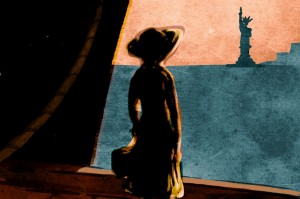by Peggy Noonan,
from The Wall Street Journal,
10/31/14:
Is sacrificing a bit of comfort for public health such a great indignity?

On a bookshelf in my home in a glass-and-brass frame I keep my great-aunt’s Ellis Island health card. It’s cardboard, about as big as your hand. She wore it on her coat during her nine-day journey from Ireland. Every day the ship’s surgeon (possibly brusquely, probably officiously) examined her for signs of acute or long-term illness. The card noted her details—immigrant, steerage, age about 20—and other facts. SS California out of Londonderry, 1909, Mary Jane Byrne, last residence Glenties. On the back it says, “Keep this Card to avoid detention at Quarantine and in Railroads in the United States.” If she failed the physicals she would be held at Ellis Island or sent back. There’s a little notch to mark each day the doctor found her healthy. In the end there were nine.
She disembarked at Ellis Island where, so enraged at this crude, assaultive violation of her civil liberties—being subjected to intimate questioning by a stranger, feeling harassed by the daily threat of rejection and expulsion, being, in effect, immigrant-shamed—she got a lawyer, sued the U.S. government, and, with Emma Goldman and Floyd Dell, started a civil-liberties movement that upended American immigration law.
Wait, that’s not what happened! She accepted with grace the needs and demands of her new nation, took no offense, and acknowledged the utility of a quarantine or ban—why would America be bringing in sick people who could spread disease? She settled in Brooklyn near the Navy Yard and became a maid, a job she worked as a true profession, for half a century. Thus was America built.
I miss such humility, don’t you? Did we fail to encourage it by forgetting to honor it? Or, if these questions are insufficiently ideological, whatever happened to courtesy to the collective? We should bring it back. We could answer the current quarantine question if we faced it with the calm of a 1909 immigrant.
An American nurse returns from Sierra Leone after treating Ebola patients. She did that on her vacation. We are proud of her. After she lands at Newark Airport she is hustled into quarantine. She is greatly shocked and indignant, loudly protests in the media. Her rights are being violated, her treatment is “inhumane.” By that she perhaps meant uncomfortable—a tent, paper scrubs, no shower. It was all on-the-fly and disorganized, a state scrambling to do what the federal government would not.
The nurse got sprung and is currently in Maine, refusing quarantine, threatening legal action, and gaily bicycling past media scrums. I see a future in politics.
Should she have been quarantined? Of course. Because she is at higher than normal risk of developing and transmitting a deadly virus.
It would have been gracious if the nurse, hearing of heightened public anxiety, and concerned for the safety of others, had patiently accepted the situation and expressed understanding.
Instead she, and the sick doctor, acted as if, when a microbe meets a respected and altruistic health-care professional, it, like the general public, is expected to bow.
Doctors Without Borders suggests those returning from health-care work in West Africa not go to work for 21 days. The military will quarantine U.S. troops back from West Africa for 21 days. Why can’t we have an overall national policy that establishes this? Why are the states forced to do it—then pressured not to?
More From The Wall Street Journal (subscription required):













